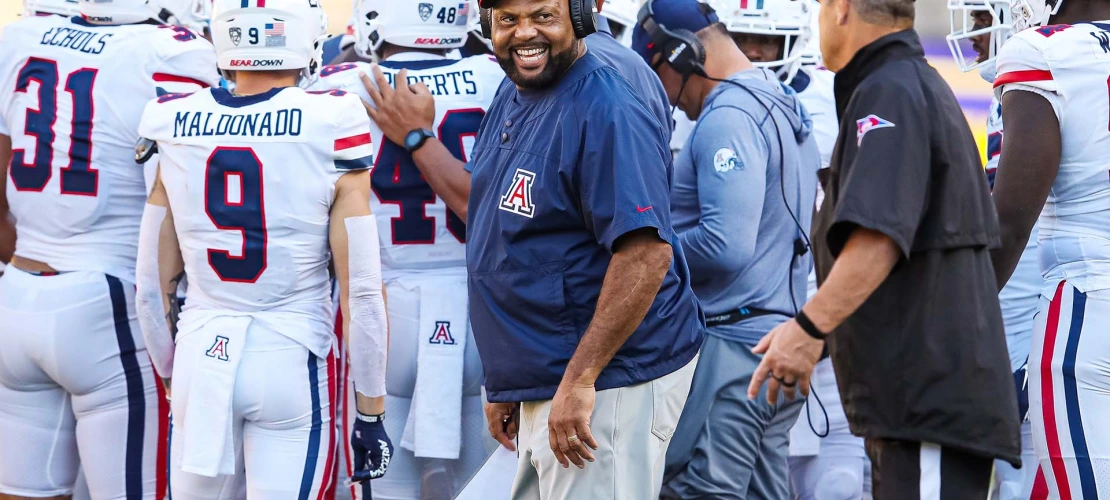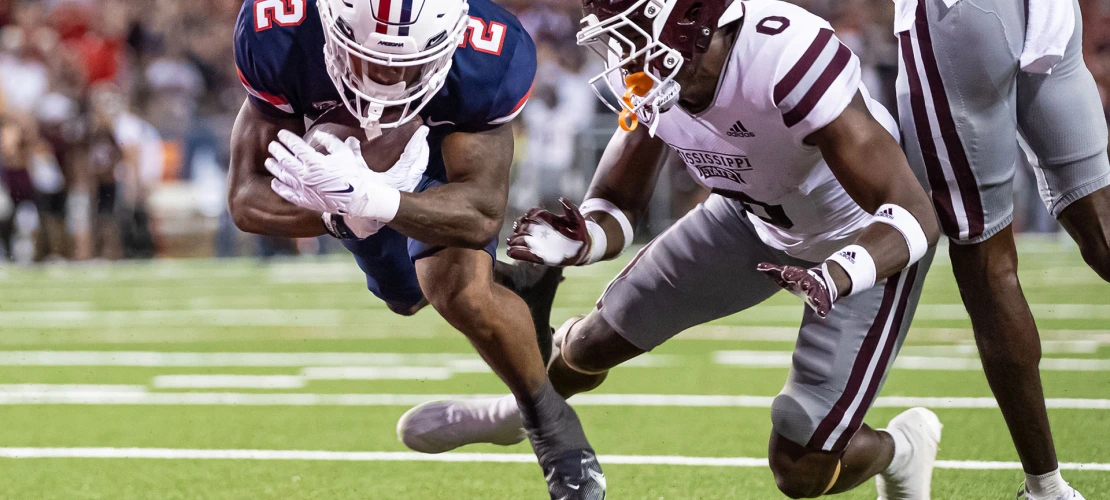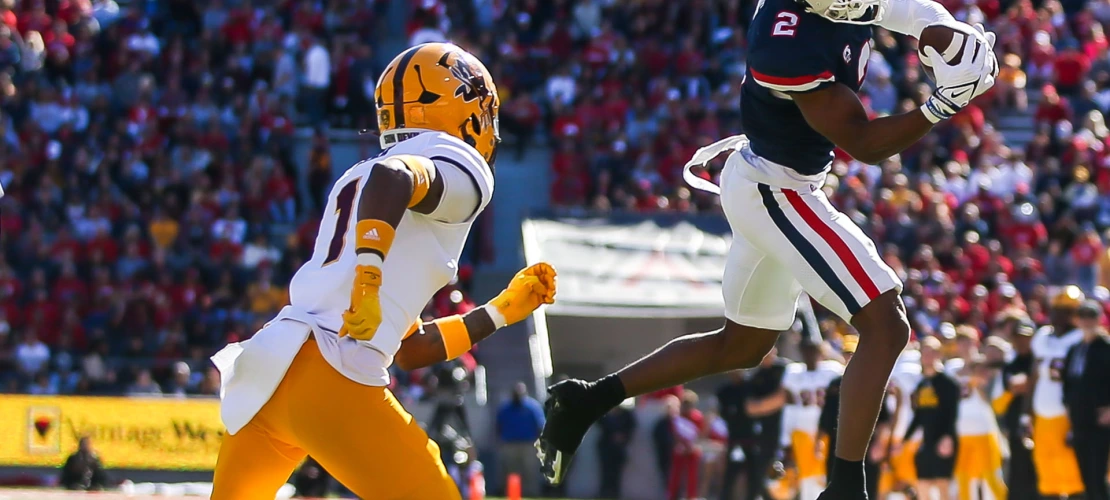The Desert Takeover Football Collective
The convergence of NIL and a conference transition are redefining what it means to ‘Bear Down, Arizona.’

Arizona Athletics
When Jacob Cowing endures football practice in 100-degree monsoon heat, he’s thinking about more than survival. He might long for a water break, certainly, but next on his list is family. And today, family doesn’t just mean his 3-year-old son and his sisters and mom.
“When Coach Fisch talked about the importance of recruiting me and my family as a part of the Wildcat family, it was something that was really special to me,” says Cowing, a Phoenix native and all-conference senior wideout for the ’Cats.
Add in name, image and likeness (NIL), and Cowing has a fresh perspective on competing.
In July 2021, the NCAA adopted an NIL policy giving college athletes the opportunity to benefit from their prominence. Student-athletes can now develop their personal brands and engage in paid commercial activities with local and national businesses in accordance with NCAA rules and state law.
“Developing my brand wasn’t something I really thought about until I came to Arizona,” Cowing says. “Before that, I had tunnel vision on taking care of my son and performing at my best on the fi eld. I was working at Door Dash and doing my best to earn a degree.”
But when Cowing spoke to children at the Boys and Girls Clubs of Tucson, he realized that being a spokesperson was meaningful. In his first NIL outing, he saw a room full of kids who reminded him why it’s important to be a role model.
“It was a special moment for me. I grew up as part of the Boys and Girls Club,” he says. “It was great to meet kids who might be going through some of the same challenges I had when I was younger.”
The Desert Takeover Football Collective
The speaking engagement was one of many for Cowing, who will continue to build community partnerships through the Desert Takeover Football Collective, a nonprofit that supports business opportunities for University of Arizona football players. The collective, a full-service program, was founded in collaboration with Wildcat supporters and community members, Arizona Athletics, Blueprint Sports, and the football program.
“My wife and I believe in supporting college athletics,” says Cole Davis, chairman of the collective. “Being a student-athlete takes discipline, from balancing an academic schedule and practice to travel and competition — making it one of the best ways to develop young people into leaders.”
NIL and college football
NIL programs similar to the Desert Takeover Football Collective are available to all student-athletes at UArizona; however, Davis believes in a dedicated program to serve the football team’s nearly 110 members.
According to Fisch, NIL has impacted college football in every way — from recruiting and retaining players to providing new opportunities for success. Players, he says, can now use on-field successes to help them off it. “They’re able to make money to help their families in ways they never could before. And it’s allowed kids to taste a little bit of financial success prior to jumping to the NFL,” he says.
A couple years in, NIL policy also has created challenges for college athletics. “We encourage players and families to understand they’re still making an educational decision and a football decision when they choose a college — it isn’t purely a money decision,” Fisch says. “We build this program around creating a sense of family, where academics and personal development matter.”
Nonetheless, NIL has created imbalances in recruiting.
In June, UArizona President Robert C. Robbins, Arizona Athletics Director Dave Heeke, Fisch and other university leaders attended “The Future of College Athletics” summit in Washington, DC. There, with schools from around the country, Fisch says he was reminded that “the schools that have the most money have the best players.”
College football also opened its transfer portal in 2018, allowing players to leave for other teams without sitting out a year.
“With the combination of the transfer portal and NIL, players are leaving for money,” Fisch says. “Now, you’re looking at a sort of free agency in college football, which never was a factor before.”
Other changes in the sport are rocking the competitive landscape, too. Traditionally, NCAA business models boast college football programs as primary revenue generators that support Olympic sports in athletics departments. Ticket sales, sponsorships and television deals keep the lights on. College football is working to develop a new 12-team format for its national playoffs. Mixed with bowl games, it will generate more than $2 billion annually beginning in 2026.
Debate continues around television profits and proceeds for players, and NIL has opened the door to future legislation that may lead to universities paying athletes. Meanwhile, conference realignment has tipped the scales.
ʻIn this new landscape, we have to make sure our student-athletes have the opportunity to capitalize on NIL opportunities. The best way to ensure we are successful is a strong collective, and we need alumni and fan support to help make that happen.'
Big 12 Conference
Arizona Athletics is preparing to move to the Big 12 Conference and compete beginning in the 2024-25 academic year. The Wildcats are joined by Arizona State, Utah and Colorado as the conference grows to 16 teams.
The shake-up creates new opportunities for Arizona Athletics.
“Our move to the Big 12 Conference will continue to raise the university’s profile by increasing visibility, growing our reach across the country and around the globe, expanding our pool of prospective students, providing more resources to support our student-athletes, and presenting them with greater NIL prospects,” Robbins said in a university statement.
Fisch, who says he appreciates the tradition of playing in the Pac-12, finds many positives in the change.
“We all love being in the Pac-12 and playing West Coast schools, but as many of those teams left, it made things more challenging,” he says. “Now it’s an opportunity to recruit nationally. It’s an opportunity for us to really put a footprint in Texas and Florida. I’ve recruited in Florida my whole life.”
He adds, “The Big 12 has some really good football, and we’re excited to be a major contender.”
Calling all alumni: Be a part of the collective
From an NIL perpective, Arizona football has room to grow. Some Big 12 programs, such as Texas Tech, TCU, Baylor, Kansas and Oklahoma State, boast successful football collectives of their own. They are reportedly providing players with substantial NIL packages starting at $25,000 thanks to financial support from boosters and alumni.
“As we move into a new conference, new challenges present themselves. Gone are the days when facilities and relationships alone are the formula for obtaining and retaining a strong roster,” Davis says. “In this new landscape, we have to make sure student-athletes have the opportunity to capitalize on NIL opportunities.
“The best way to ensure we are successful is a strong collective, and we need alumni and fan support to help make that happen.”
There are several ways for alumni to get involved with the collective. For example, businesses can partner with student-athletes for marketing campaigns, digital activations or special events. Football players also earn compensation for supporting charitable causes and have provided more than 3,000 hours of community engagement.
‘Bear Down’ Tradition
The Arizona football tradition is built on the “Bear Down” motto, with gritty teams like former coach Dick Tomey’s, who baffled opponents with his Desert Swarm defense.
However, the program hasn’t won a bowl game since 2015. Its last major coup was going 12-1 and beating Nebraska 23-20 in the 1998 Culligan Holiday Bowl. The Wildcats won just six games the next year; Tomey resigned after the 2000 season, and since then, the Wildcats have performed mostly as a “middle of the Pac” team.
Fisch says the program’s focus is on getting back to a season like 1998’s. And die-hard fans, too, are eager to witness championship-caliber Wildcat football, regardless of conference affiliation.
Just ask Tim Hall ’03, who founded the Red Army football fan club as an undergrad. Today, he is athletics director at Tucson Country Day School. He and his Red Army cohort still attend every game.
“There is something special about those big moments, upset wins, crazy come-from-behind victories and historic seasons,” he says. “You really have to be in the stadium in order to experience those thrilling moments.”
Luckily, fans will still get to rally behind the Wildcats in the Territorial Cup against ASU, and experience new moments like one that Hall describes: “Trung Canidate running wild against that school up north.”
ʻI see the city of Tucson as just one big family. The more student-athletes engage with the community, the more support we can get at games. It’s important for fans to meet you and hear your story to build those relationships. It’s also really important that we know the stories of those who support us.'
He’s on board with NIL, too, saying, “Student-athletes deserve opportunities to earn money from their fame.” And Hall and Fisch agree that Tucson has a competitive advantage in the NIL marketplace, because Wildcat sports are the only game in town.
As Cowing prepares for his team’s next big game, he’s looking forward to being backed by his town.
“I see the city of Tucson as just one big family,” Cowing says. “The more student-athletes engage with the community, the more support we can get at games. It’s important for fans to meet you and hear your story to build those relationships. It’s also really important that we know the stories of those who support us.”
Support Wildcat Football
Make a Donation
Make a tax-deductible donation to Desert Takeover through a partnership with the BPS Foundation, a 501(c)3 organization. Student-athletes will partner with a local nonprofit organization to work on charitable causes.
Become a Member
Become a member of Desert Takeover and receive exclusive member benefits, like meet-and-greets with student-athletes, autographed merchandise and more.
Become a Corporate Sponsor
NIL provides opportunities for local and national sponsors to partner with Arizona football student-athletes for endorsement deals, marketing campaigns, appearances and other projects.



